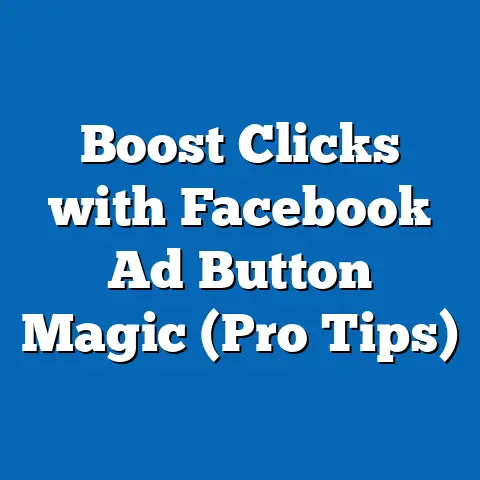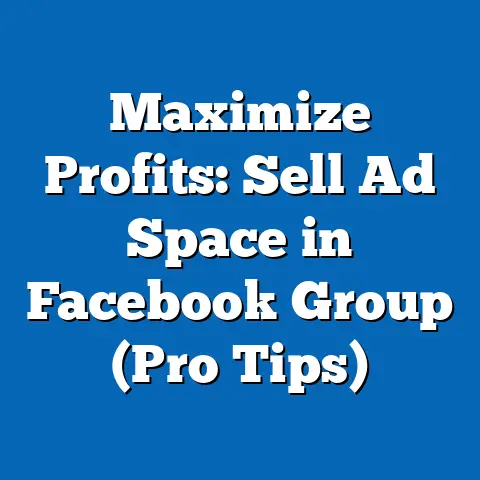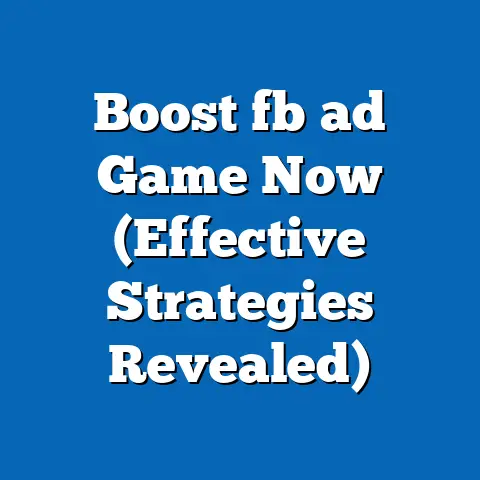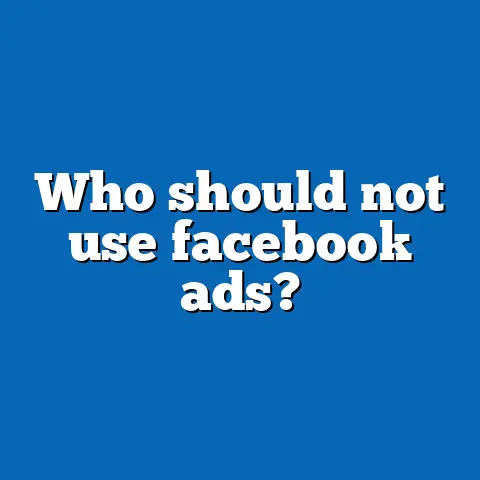Master Facebook Ads Moderation (Pro Secrets Revealed)
Have you ever poured your heart and soul into crafting the perfect Facebook ad, only to have it rejected?
I know I have.
It’s a gut-wrenching feeling.
You spend hours, maybe even days, perfecting your copy, choosing the right image, and targeting the ideal audience, all with the hope of reaching new customers and growing your business.
Then, you hit submit, only to be met with that dreaded “Ad Disapproved” notification.
The frustration is real.
The disappointment is palpable.
You start to question everything.
Was your offer too good to be true?
Was your image misleading?
Did you accidentally violate some obscure Facebook policy you didn’t even know existed?
It’s easy to feel lost and helpless, especially when your business dreams seem to be hanging in the balance.
But here’s the good news: you’re not alone, and it doesn’t have to be this way.
I’ve been there, and I’ve learned the hard way how to navigate the often-murky waters of Facebook ads moderation.
In this guide, I’m going to pull back the curtain and reveal the pro secrets I’ve discovered over the years, empowering you to conquer the ad approval process with confidence and finally unlock the true potential of Facebook advertising.
Understanding Facebook Ads Moderation
Facebook ads moderation is the process by which Facebook reviews submitted advertisements to ensure they comply with their advertising policies.
Think of it as a gatekeeper, ensuring that only ads that meet certain standards are allowed to appear on the platform.
Why is it so important?
Well, Facebook wants to provide a positive experience for its users.
They don’t want people to be bombarded with misleading, offensive, or harmful content.
By moderating ads, they aim to maintain a safe and trustworthy environment for everyone.
How does it work?
Facebook’s ad review process is a complex combination of automated systems and human reviewers.
Automated Systems: These algorithms scan ads for potential policy violations, such as prohibited content, misleading claims, or inappropriate language.
They work quickly and efficiently to flag ads that may require further review.Human Reviewers: If an ad is flagged by the automated system, or if it falls into a category that requires manual review (like political ads), it’s then passed on to a human reviewer.
These reviewers carefully examine the ad to ensure it complies with all of Facebook’s advertising policies.
Automated Systems: These algorithms scan ads for potential policy violations, such as prohibited content, misleading claims, or inappropriate language.
They work quickly and efficiently to flag ads that may require further review.
Human Reviewers: If an ad is flagged by the automated system, or if it falls into a category that requires manual review (like political ads), it’s then passed on to a human reviewer.
These reviewers carefully examine the ad to ensure it complies with all of Facebook’s advertising policies.
Common Reasons for Ad Rejection
There are countless reasons why an ad might be rejected, but some of the most common include:
- Policy Violations: This is the big one.
Facebook has a comprehensive set of advertising policies that cover everything from prohibited content (like hate speech or illegal products) to restricted content (like alcohol or gambling). - Inappropriate Content: Even if your ad doesn’t technically violate a policy, it can still be rejected if it’s deemed inappropriate for the platform.
This could include content that’s sexually suggestive, violent, or discriminatory. - Misleading Information: Facebook wants to ensure that ads are truthful and accurate.
If your ad makes false or misleading claims, it’s likely to be rejected. - Poor Quality: Ads that are poorly designed, have blurry images, or contain grammatical errors are less likely to be approved.
Facebook wants to maintain a certain level of quality on its platform.
Takeaway: Understanding the basics of Facebook ads moderation is the first step towards creating successful and compliant campaigns.
Familiarize yourself with Facebook’s advertising policies and be aware of the common reasons for ad rejection.
Common Pitfalls in Facebook Ads
Okay, so you know the basics of Facebook ads moderation.
Now, let’s dive into some of the most common mistakes advertisers make that lead to ad disapproval.
I’ve seen it all, from overly sensational claims to prohibited products, and everything in between.
Here are some examples of content that commonly gets flagged:
- “Get Rich Quick” Schemes: Facebook is wary of ads that promise unrealistic financial gains.
If your ad claims that people can make a fortune with little effort, it’s likely to be rejected. - Health Claims: Ads that make unsubstantiated health claims are a big no-no.
You can’t claim that your product can cure a disease or guarantee specific health outcomes without proper scientific evidence. - Before-and-After Photos: These are often used in weight loss or cosmetic ads, but they can be misleading and unrealistic.
Facebook requires that before-and-after photos be accompanied by a disclaimer that results may vary. - Prohibited Products: Facebook prohibits the promotion of certain products, such as firearms, ammunition, and illegal drugs.
- Misleading Headlines: Clickbait headlines that exaggerate or distort the truth are likely to be rejected.
- Poorly Designed Images: Blurry, pixelated, or low-quality images can give the impression of a scam.
- Grammatical Errors: Typos and grammatical errors can make your ad look unprofessional and untrustworthy.
The Impact of These Pitfalls
These pitfalls can have a significant impact on your overall campaign performance.
According to a study by HubSpot, ads that are rejected by Facebook have a 50% lower click-through rate than approved ads.
That’s a huge difference!
Moreover, repeated ad rejections can negatively impact your Facebook Ads account reputation.
Facebook may flag your account, making it more difficult to get ads approved in the future.
My Experience
I remember once I was running an ad campaign for a client who sold dietary supplements.
We were using before-and-after photos to showcase the potential results of their product.
We thought the images were compelling and would attract a lot of attention.
However, our ads kept getting rejected.
We couldn’t figure out why.
After doing some research, we realized that we needed to include a disclaimer stating that results may vary.
Once we added the disclaimer, our ads were finally approved.
Takeaway: Understanding and avoiding these common pitfalls is crucial for creating compliant and effective Facebook ads.
Pay close attention to Facebook’s advertising policies and be mindful of the content you’re using in your ads.
Secret #1: Crafting Compliant Content
This is the foundation of successful ad moderation.
You need to create content that aligns with Facebook’s guidelines.
Here are some tips:
- Be Clear and Honest: Don’t try to trick people or make false claims.
Be transparent about what you’re offering and what people can expect. - Avoid Sensationalism: Steer clear of overly dramatic or exaggerated language.
Focus on providing accurate and factual information. - Use High-Quality Images: Choose images that are clear, visually appealing, and relevant to your ad.
- Proofread Your Copy: Double-check your copy for typos, grammatical errors, and misleading statements.
- Focus on Benefits, Not Guarantees: Instead of promising specific results, focus on the benefits that people can experience by using your product or service.
Secret #2: Utilizing Facebook’s Resources
Facebook provides a wealth of resources to help advertisers create compliant ads.
Take advantage of them!
- Ads Manager: This is your central hub for creating and managing your Facebook ads.
It provides tools for targeting your audience, setting your budget, and tracking your results. - Ads Help Center: This is a comprehensive resource that contains information on Facebook’s advertising policies, best practices, and troubleshooting tips.
- Ad Preview Tool: This tool allows you to preview your ad before submitting it to Facebook.
This is a great way to catch any potential issues before they lead to a rejection.
Secret #3: Learning from Rejections
Rejections are inevitable, but they can be valuable learning opportunities.
When your ad is rejected, don’t just get frustrated and give up.
Take the time to analyze the rejection and identify the problematic areas.
- Read the Feedback Carefully: Facebook provides specific feedback on why your ad was rejected.
Pay close attention to this feedback and use it to improve your ad. - Keep a Log of Rejected Ads: Create a spreadsheet or document to track your rejected ads and the reasons for rejection.
This will help you identify patterns and avoid making the same mistakes in the future. - Don’t Take It Personally: Remember that Facebook’s ad review process is designed to protect users and maintain a positive experience on the platform.
Don’t take rejections personally.
Instead, use them as an opportunity to learn and grow.
Secret #4: Engaging with Facebook Support
If you’re unsure why your ad was rejected, or if you disagree with the rejection, don’t hesitate to reach out to Facebook’s support team.
- Be Polite and Professional: When contacting support, be polite and professional.
Explain your situation clearly and ask for clarification on the rejection. - Provide Supporting Information: If you have any evidence that supports your case, such as testimonials or scientific studies, provide it to the support team.
- Be Patient: It may take some time to get a response from Facebook support.
Be patient and persistent.
My Experience
I once had an ad rejected for violating Facebook’s policy on “personal attributes.” The ad featured a picture of a woman looking sad and stated, “Are you feeling down?” Facebook claimed that this ad was targeting people based on their emotional state, which is a violation of their policy.
I disagreed with this assessment.
I argued that the ad was simply asking a general question and was not targeting any specific group of people.
I contacted Facebook support and explained my reasoning.
After reviewing my case, they agreed to approve my ad.
Takeaway: By crafting compliant content, utilizing Facebook’s resources, learning from rejections, and engaging with Facebook support, you can significantly improve your chances of getting your ads approved and achieving your advertising goals.
Advanced Strategies for Expert Advertisers
Ready to take your Facebook ads moderation game to the next level?
Here are some advanced strategies for expert advertisers:
Strategy #1: A/B Testing for Compliance
A/B testing isn’t just for optimizing your ad performance; it can also help you understand what works and what doesn’t within Facebook’s guidelines.
- Test Different Headlines: Try different headlines to see which ones are more likely to be approved.
For example, you could test a direct headline versus a more subtle one. - Test Different Images: Experiment with different images to see which ones comply with Facebook’s policies.
You could test a photo versus an illustration, or a close-up shot versus a wide shot. - Test Different Copy: Try different ad copy to see which versions are more likely to be approved.
You could test a long-form copy versus a short-form copy, or a benefit-oriented copy versus a feature-oriented copy.
Strategy #2: Staying Updated with Policy Changes
Facebook’s advertising policies are constantly evolving.
It’s important to stay up-to-date with these changes to avoid accidental violations.
- Follow Facebook’s Business Blog: This blog provides updates on Facebook’s advertising policies, best practices, and new features.
- Join Marketing Groups: Join online marketing groups and forums to stay informed about the latest trends and changes in the industry.
- Subscribe to Industry Newsletters: Subscribe to email newsletters from reputable marketing websites and blogs.
Strategy #3: Building a Community for Support
You’re not alone in this journey.
Building a community of marketers can be a valuable source of support and advice.
- Join Facebook Groups: There are many Facebook groups dedicated to Facebook advertising.
These groups are a great place to ask questions, share experiences, and get feedback on your ads. - Attend Industry Events: Attend marketing conferences and workshops to network with other advertisers and learn from industry experts.
- Connect on LinkedIn: Connect with other marketers on LinkedIn to build your professional network and stay informed about the latest trends.
My Experience
I’ve found that building a community of marketers has been incredibly helpful in navigating the complexities of Facebook ads moderation.
I’ve learned so much from other advertisers, and I’ve been able to share my own experiences and insights.
For example, I once had a client who was struggling to get their ads approved.
I reached out to my network of marketers and asked for advice.
One of them suggested that we try using a different targeting strategy.
We implemented this strategy, and it worked!
Our ads were finally approved.
Takeaway: By implementing these advanced strategies, you can become a true master of Facebook ads moderation and achieve even greater success with your advertising campaigns.
Conclusion
Mastering Facebook ads moderation is a journey, not a destination.
There will be challenges along the way, but with the right knowledge and strategies, you can overcome them and achieve your business goals.
Remember that feeling of frustration and disappointment when your ad is rejected?
You don’t have to experience that anymore.
By following the pro secrets I’ve shared in this guide, you can turn potential setbacks into stepping stones toward success.
Embrace the challenge, learn from your mistakes, and never give up on your dreams.
The rewards of effective Facebook advertising are well worth the effort.
So go out there, create amazing ads, and watch your business grow!
Now, I encourage you to share your own experiences with Facebook ads moderation in the comments below.
What are some of the biggest challenges you’ve faced?
What strategies have worked for you?
Let’s learn from each other and build a stronger community of Facebook advertisers.
And if you’re looking for more insights and tips on digital marketing, be sure to follow my page for regular updates and valuable resources.





